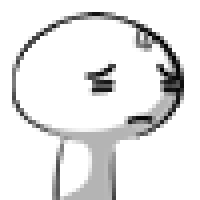I have been modeling some Gyroids recently, but I can’t improve it anymore, would appreciate some help. Below I described the steps to achieve the best result I got until now, so it might be easier to spot where the flaw/improvement is (Also am attaching some files here - SW2021 Version):
- Create a cube and convert it to 3DSketch (with origin in the center)
- Draw Arcs and constrain them on the planes of the cube (have also done it with Fit Spline and made them tangent, but the result was not neat)
- Delete Body (Original Cube used for the first 3DSketch)
- Convert Entities (Arcs) in different 3DSketches and Extrude Surfaces with them
- Create 6 Planes parallels to the originals and create Split Lines where they intersect the Surfaces (so it is possible to select de edges without the corners)
- Create another 3DSketch, convert the Split Lines and draw tangent Splines connecting the lines (reset their handles) [1]
- Fill Surface with edge tangency and the 3DSketch of Splines [2]
- 6 Fill Surfaces with edge tangency in the corners [3]
- Knit
- Thicken
[1] Guess a point of improvement would be not using splines at all, what can be done here? I tried using Curve Through Reference Points, but the result was worse.
[2] Also tried Curvature on settings and uncheck Optimize surface. But I have some problems trying to compare different results, how would you suggest doing it?
[3] Tried different distances for those parallels planes (changing the Split Line position), but the result was kind of the same independent of those Filled Surfaces sizes
Later is where the trouble comes:
- Create an Assembly and start connecting the surfaces (using planes as reference Mates).
Somehow the tangency on the Edges are not really tangent and it is notable the singularity on the corners (suppressing the Thicken helps to analyse better).
- After creating a “cell” assembling 8 surfaces, create a New Part inside the assembly and Join it all together in one part.
- Combine to merge all the bodies.
*Somehow the corners get all knitted and neat here and I have no idea why. (Did not use “Force surface contact” in Join Feature - when I used it the waiting time was so long that I gave up.)
- After the unexpected result, pattern it twice to create a large volume with it.
*Notice that the corner will not be properly merging, but repeating the previous steps (Create New Part -> Join -> Combine) will fix it again. ???? lol
-> Does anyone know why the Combine feature is knitting the corners? This is the result I wanted but it should be already merged when connecting the bodies in the Assembly. Also, how can I make the geometry perfectly tangent, like a gyroid should be? Guess the main problem is in the Filled Surfaces in the corners
-> Any suggestions on the steps are welcome.
I exported many STL files and checked them in Materialise Magics, did not require any fixing for the structure (which was great
Pictures in SW and Magics with/without Combine Feature
Since some files are more them 50MB I hosted it on Drive: https://drive.google.com/drive/folders/ ... sp=sharing


